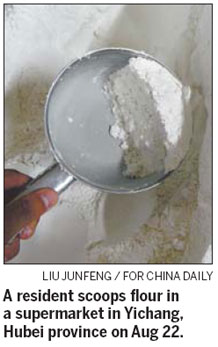Society
Ban on bleaching agent considered
By Wang Yan (China Daily)
Updated: 2010-09-15 08:05
 |
Large Medium Small |
BEIJING - The Ministry of Health (MOH) is considering a ban on a popular flour bleaching agent in response to growing public concerns over the abusive use of the chemical whitening agent.
The ministry is coordinating with relevant government departments to research the policies on benzoyl peroxide (BPO) as a flour additive, the Beijing News reported on Tuesday.
The move came after the MOH completed a three-month bid to seek public suggestions on a draft revision to the current national standards on food additives.
The ministry received nearly 100 suggestions from the public by the end of August, with some proposing a ban on BPO in flour production, said the report.
BPO is often blended with corn flour to make the flour bleaching agent, which creates a white color.
Ministry officials have been cooperating with the National Food Additives Standardization & Technology Committee (NFASTC) to research what effect the ban of BPO would have on industry and foreign trade, the Beijing News reported.
|
||||
However, growing food safety problems in recent years, such as the melamine added to milk powders that caused kidney stones in babies, have prompted more people to oppose the use of additives in the past few years.

About 100 large flour-production companies appealed for a ban of whitening additives in flour in October 2008, one month after the disclosure of melamine-tainted Sanlu milk powder.
The State Administration of Grain (SAG) has been against the use of BPO.
"We have done lots of research and passed on suggestions to the health ministry several times," a staffer with the SAG policy and regulations department, who declined to be named, told China Daily on Tuesday.
"Some other departments are also working with us to promote the issue, including the standardization administration."
An employee at the general office of Beijing Guchuan Food Co, the largest flour production company in Beijing, told China Daily on Tuesday that in order to promote sales, the company had to add whitening agents into large packages of flour, but not small packs.
"The whitening agents cost about 12,900 yuan ($1,897) for each ton, which actually adds to the expense of our company," she said.
Sang Liwei, a Beijing-based food safety lawyer and the Beijing chief representative of the nonprofit Global Food Safety Forum, supports the ban on BPO.
"It is not necessary to add bleaching agents to the flour. All it does is make it look white so consumers would like it more. Under the current production techniques, the flour is white enough even without bleaching agents," Sang said.
He is also worried that some manufacturers will not strictly follow the standards in the use of BPO.
"The fact is that we are not able to check each and every batch of the product yet," he said.
In early April, investigations found that some bleaching agents widely used in flour production contain as much as 30 percent pulverized lime, a substance that has been linked to health problems.
Even with the increasing pressure to ban BPO as an additive in flour, some scientists still believe that BPO should not be banned.
Chen Junshi, an academician at the Chinese Academy of Sciences and also the director of the NFASTC, said that no evidence exists to prove that BPO is harmful to the human body, and that it is safe to eat, according to a report of Beijing-based Legal Weekly on Sept 1.
Ding Jie contributed to this story.

